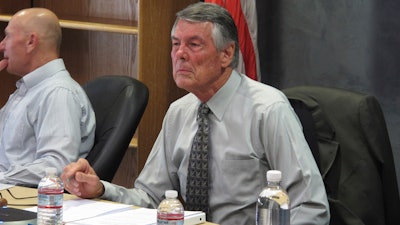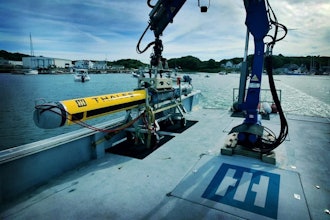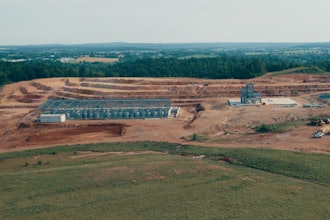
CARSON CITY, Nev. (AP) — Nevada's Environmental Commission rejected conservationists' appeal Wednesday of a water pollution control permit granted last year for a huge open-pit mine critics warn could pollute the state's precious groundwater for centuries.
The Great Basin Resource Watch had urged the state panel to rescind the permit for a molybdenum (muh-LIB'-duh-nuhm) mine that a subsidiary of Denver-based General Moly Inc. wants to dig on Mount Hope near Eureka about 250 miles (400 kilometers) east of Reno.
Scientific experts for the Reno-based environmental watchdog testified Wednesday that the permit was based on a flawed calculation that dramatically underestimates the amount of contamination that will flow into the mile-wide (1.6 kilometer-wide) pit when mining is complete and it begins to fill with water.
The commissioners upheld the permit on a 3-0 vote after more than eight hours of testimony.
But they also issued a special directive for the Nevada Division of Environmental Protection to work with the group to address its ongoing concerns, as well as discuss potential changes to state laws or regulations to better protect water quality in the pit lakes after mining ends.
Molybdenum is a metal with a high melting point used to refine oil and make electrodes, missile and aircraft parts.
The Great Basin Resource Watch and others have been fighting in federal court since 2012 to block Eureka Moly LLC's plans to build the mine covering about 12 square miles (31 square kilometers).
The mining operation is expected to last 44 years but there's no current projection for when it might begin. It's expected to produce 1.7 billion tons of waste rock, about one-fourth of it considered potential acid-generating material.
Glenn Miller, a retired professor who taught environmental sciences for 40 years at the University of Nevada, Reno and now serves on the watchdog group's board, said the company has "grossly" underestimated the amount of acid drainage that will send sulfates into the pit lake he says will last for 500 years.
"Their prediction is hopelessly unrealistic," he said. "It's just not even in the realm of possibility."
Scientists for the Nevada Department of Environmental Protection who recommended approval of the original permit last year disagreed.
"It does not pose any threat to degrading groundwater," said Christine Olson, an environmental scientist for the agency's Bureau of Mining, Regulation and Reclamation.
Commissioner Tom Porta said he wasn't willing to "look into a crystal ball" and conclude the state's experts are wrong.
"I have to defer to the technical expertise of the division. ... One thing I've heard from both sides is there's always uncertainty no matter what we do," Porta said. He also said he takes "some level of comfort" in the fact the permit requires the mining company to reanalyze the situation six months after any mining actually begins.
Commission Chairman Jim Gans and Commissioner Kathryn Landreth said they struggled with the decision. Landreth indicated she would have voted the other way if not for the additional language requiring the department to report back in six months on continued discussions with the watchdog group.
"I remain deeply concerned," Landreth said.
"In Nevada for too long we've probably ignored some of the consequences," she said about the arid western state that leads the nation in gold production.
Gans said he too was "really torn."
"My opinion is a lot of these pit lakes have been a disaster," he said. "But I really believe they met the law."
"That's my quandary," Gans said before eventually seconding Porta's motion to uphold the permit.
Julie Cavanaugh-Bill, a lawyer for the watchdog group, said the commission-ordered talks with the state agency will present an opportunity to discuss needed changes in state law.
"We don't have adequate protection under the law to protect the quality of pit lake water," she said.





















